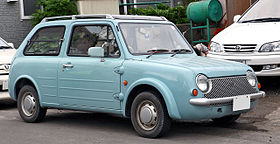Nissan Pao
| Pao | |
|---|---|
 |
|
| Overview | |
| Manufacturer | Nissan Motors (by Aichi Machine Industry) |
| Production | 1989-1991 |
| Assembly | Oppama Plant, Yokosuka, Kanagawa, Japan |
| Designer | |
| Body and chassis | |
| Related | |
| Powertrain | |
| Engine | 1.0 L MA10S I4 |
| Transmission | |
| Dimensions | |
| Wheelbase | 2300 mm (91 in) |
| Length | 3740 mm (147 in) |
| Width | 1570 mm (62 in) |
| Height | 1475 mm (58 in) |
| Curb weight | 720–760 kg (1590–1675 lb) |
The Nissan Pao is a retro-styled three-door hatchback manufactured by Nissan for model years 1989-1991, and originally marketed solely in Japan at their Nissan Cherry Stores.
First announced at the Tokyo Motor Show in October 1987, the Pao was available with or without a textile sun roof and was originally marketed without Nissan branding, by reservation only from January 15 through April 14, 1989. Orders were delivered on a first come-first served basis, with the production run of 51,657 selling out in 3 months.
Because of its origins at Pike Factory, Nissan's special project group, the Pao — along with the Nissan Figaro, Be-1 and S-Cargo — are known as Nissan's "Pike cars."
In 2011, noted design critic Phil Patton, writing for the New York Times, called the Pike cars "the height of postmodernism" and "unabashedly retro, promiscuously combining elements of the Citroën 2CV, Renault 4, Mini [and] Fiat 500."
Part of Nissan's "Pike" series, it was designed as a retro fashionable city car in the mold of the Be-1. It included external door hinges like the original 1960s Austin Mini which had become fashionable in Japan, 'flap-up' windows like those of a Citroën 2CV, and a split rear tailgate of the first British hatchback car the Austin A40 Farina Countryman. The Be-1, Pao, Figaro, and S-Cargo were attempts to create cars with designs as desirable as those of Panasonic, Sony, and other personal electronics products.
...
Wikipedia
